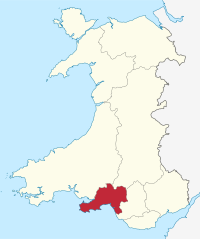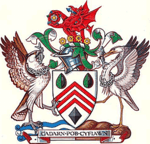West Glamorgan facts for kids
| West Glamorgan Welsh: Gorllewin Morgannwg |
|
 West Glamorgan shown within Wales as a preserved county |
|
| Geography | |
| Status |
|
| 2003 area | 820 km2 |
| 2022 area | 819 km2 (6th) |
| HQ | County Hall, Swansea |
| History | |
| Created | 1974 |
| Abolished | 1996 |
| Succeeded by | Swansea Neath Port Talbot Preserved county of West Glamorgan |
| 2022 population | 383,440 (6th) |
Quick facts for kids Politics |
|
|---|---|
| Governance | West Glamorgan County Council (abolished 1996) |
 Coat of arms of West Glamorgan County Council |
|
| Subdivisions | |
| Type | Non-metropolitan districts |
| Units |
|
West Glamorgan (which is called Welsh: Gorllewin Morgannwg in Welsh) used to be an important area in South Wales. Today, it's known as a 'preserved county.' This means it's still recognized for some special purposes, even though it doesn't have its own local government anymore.
Contents
History of West Glamorgan
West Glamorgan was once part of the much older and larger area called Glamorgan. It was officially created on 1 April 1974. This happened because of a new law called the Local Government Act 1972.
How West Glamorgan Was Formed
When West Glamorgan was created, it brought together several smaller areas. These included the big town of Swansea, and the towns of Neath and Port Talbot. It also included smaller urban areas like Glyncorrwg and Llwchwr, and rural areas like Gower and Pontardawe. Most of the Neath rural area also joined, except for one small part called Rhigos.
Local Government and Districts
From 1982, the main offices for the West Glamorgan County Council were in County Hall, Swansea. This council was in charge of running the area.
West Glamorgan was divided into four smaller areas, called districts:
- Swansea: This district included the city of Swansea and the Gower rural area.
- Lliw Valley: This district was made up of Llwchwr and the Pontardawe rural area.
- Neath: This district included the town of Neath and its surrounding rural area.
- Port Talbot: This district covered the town of Port Talbot and Glyncorrwg.
Changes in 1996
West Glamorgan and its districts stopped being administrative areas on 1 April 1996. This change happened because of another law, the Local Government (Wales) Act 1994.
The area was then split into two new, independent local government areas. These are called unitary authorities. They are:
- Swansea
- Neath and Port Talbot (which later became just "Neath Port Talbot")
The Lliw Valley district was divided between these two new authorities. Even though West Glamorgan no longer has its own local government, it still exists as a 'preserved county.' This means it's used for special roles like the Lord-Lieutenancy and High Shrievalty. These are important ceremonial positions.
West Glamorgan's Coat of Arms
The coat of arms for West Glamorgan is a special design that tells a story about the area.
Symbols and Meanings
The shield part of the arms has:
- Three red V-shapes (called chevronels) on a silver background. These come from the old de Clare family, who were important in the area's history.
- Two green pine cones at the top, which represent the forests.
- Two black drops (called gouttes), which stand for the oil industry.
- A black diamond shape (called a lozenge) at the bottom, which represents coal.
Above the shield is a Welsh Dragon. This dragon is holding a Tudor rose and stands above four gold cogwheels. The four cogwheels show the four districts of West Glamorgan and their industries.
The supporters are animals on either side of the shield:
- An osprey (a type of bird that eats fish) holding a fish in its beak and standing on water. This represents fishing.
- A heron (another bird that eats fish) also holding a fish and standing on a ploughed field. This represents farming.
- Both birds have chains around their necks, which stand for the steel and aluminium industries.
The motto of West Glamorgan is Cadarn pob cyfiawn. In Welsh, this means 'The just are strong.'
See also
 In Spanish: Glamorgan del Oeste para niños
In Spanish: Glamorgan del Oeste para niños
 | Selma Burke |
 | Pauline Powell Burns |
 | Frederick J. Brown |
 | Robert Blackburn |

